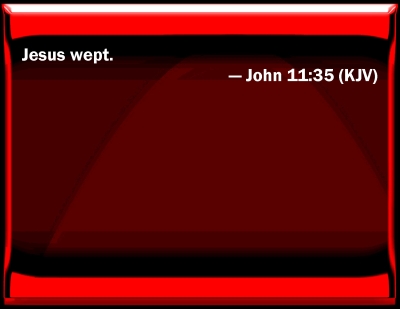
Thus, in his sobbing and weeping, Jesus again sets a standard that we strive to emulate: having very deep feelings, but not losing control of ourselves in the midst of those feelings. Then said the Jews, Behold how he loved him And some of them said, Could not this man, which opened the. No wonder Isaiah foretold that Jesus would be “a man of sorrows, and acquainted with grief” (Isa. John 11:35-40 King James Version KJV Jesus wept. Jesus’ strong emotional reaction in the situation shows how deeply he was both in touch with how he felt (he did not have a head-heart disassociation problem), and that he had very deep emotions. But having strong emotions is not a sin, and not even a sign of weakness. 460) taught that Jesus wept to set “a law with his tears…He defined the bounds of grief.” bĪll of these explanations fundamentally deny that Jesus had true human emotions and was overwhelmed by them. 450), a bishop and doctor in the Church, wrote that Jesus did not weep out of human weakness, but “because he was welcoming him back.” Potamius of Lisbon, a bishop in the mid-fourth century AD, wrote that one reason Jesus wept was to “moderate the sisters’ outpouring of grief.” Augustine (354-430) said that Jesus wept to teach us to weep. Hippolytus of Rome (170-235) wrote that Jesus wept “to give us an example.” Peter Chrysologus (c. For that to happen Jesus’ humanity would have had to have overridden his godhood, but how could that happen? So this verse has caused problems. God would not have been so overcome by emotion.

Most point out that this verse shows Jesus’ true humanity, but that glosses over the fact that he was also supposedly God. Indeed, Trinitarians have wrestled with this verse. If he were God in the flesh he would have been better prepared for the situation and not, it seems clear, overcome with emotion.

#11 35 BIBLE FREE#
Verses like this show us the true humanity of Jesus-that he was fully human and the Son of God, not God the Son. Bible > John > Chapter 11 > Verse 35 eBibles Free Downloads Audio John 11:35 Context Crossref Greek Verse (Click for Chapter) New International Version Jesus wept. Here he holds back his voice but experiences the deep emotion from the circumstances around him: the death of his friend, the pain of Mary and Martha, the misunderstanding of his apostles, the ignorance and duplicity of the Jews. In Luke Jesus bursts into audible sobs, here he bursts into tears. In Luke, the Greek word is klaiō, while John 11:35 uses dakruō, but both verbs are in the aorist tense active voice, and refer to a sudden outburst of emotion. William’s translation renders it: “Jesus burst into tears.” In contrast, when Jesus got over the Mount of Olives and could see Jerusalem he “burst into sobs,” broke into audible crying. Here in John 11:35, dakruō is in the aorist tense, active voice, and as such most likely means “burst into tears.” a C. Klaiō occurs some 40 times in the New Testament. The cognate noun, dakruon, which occurs ten times in the New Testament, is a “tear,” and the plural noun can refer to “tears” or “weeping.” Dakruō usually means to weep or cry quietly without loud wailing, and it means that here in John 11:35, and is in stark contrast to klaiō (#2799 κλαίω pronounced 'kly-ō), which means to cry, weep, or mourn, usually with loud and open crying or mourning (John 11:31, 33). The verb literally means “to shed tears,” and thus means to cry or weep, and this is the only time it is used in the New Testament. But if water has been put on the seed and a carcass falls on it, you must treat it as unclean.“burst into tears.” The Greek word is dakruō (#1145 δακρύω pronounced dack-'roo-ō). If a carcass falls on any seeds that are to be planted, they remain clean. A spring, though, or a cistern for collecting water remains clean, but if you touch one of these carcasses you’re ritually unclean. Anything that one of these carcasses falls on is unclean-an oven or cooking pot must be broken up they’re unclean and must be treated as unclean. Any food that could be eaten but has water on it from such a pot is unclean, and any liquid that could be drunk from it is unclean. If one of these dead creatures falls into a clay pot, everything in the pot is unclean and you must break the pot. Put it in the water-it’s unclean until evening, and then it’s clean. When one of them dies and falls on something, that becomes unclean no matter what it’s used for, whether it’s made of wood, cloth, hide, or sackcloth.

If you touch them when they are dead, you are ritually unclean until evening.

Among the crawling creatures, these are unclean for you. “Among the creatures that crawl on the ground, the following are unclean for you: weasel, rat, all lizards, gecko, monitor lizard, wall lizard, skink, chameleon.


 0 kommentar(er)
0 kommentar(er)
